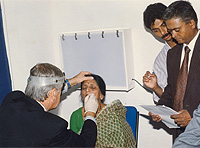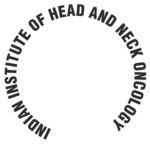Treatment
Indian Institute of Head and Neck Oncology
Given the fact that head and neck cancers account for 40% of the cancer burden in India, an important focus of the Foundation’s activities is the phase wise development of the Indian Institute of Head and Neck Oncology (IIHNO), a proposed national centre for mouth and throat cancers on the 10 acres of land given by the state government of Madhya Pradesh in village Pigdamber, approximately 15 km from the city of Indore.
The Indian Institute of Head and Neck Oncology (IIHNO) started on 15.08.1995 as a radiotherapy facility with a second hand Eldorado 78 tele cobalt unit gifted by the Nargis Dutt Memorial Foundation, Ottawa-Hull, Canada.
From 15.08.1995 to 28.2.1999, all patients were treated free of cost. From March 1, 1999, it was decided to start a graded system of charges – from completely free treatment for the very poor patients to full charges from the patients who can afford it. We try to ensure that a patient is not denied treatment because s/he does not have the necessary funds, giving either partial waiver of the fees or completely free radiotherapy.
 Dr. Francois Demard, well known cancer surgeon from France, examining a patient treated by the Foundation doctors. Dr. Francois Demard, well known cancer surgeon from France, examining a patient treated by the Foundation doctors. |
 Dr. Vikram Bhadrasain examining a patient treated at the Indian Institute of Head & Neck Oncology. Dr. Vikram Bhadrasain examining a patient treated at the Indian Institute of Head & Neck Oncology. |
The institute is working on standardizing treatment protocols as per national and international guidelines (evidence based medicine). The guidance of two of our Working Trustees, Dr. R Gopal, senior Medical Oncologist, Mumbai, & Dr. Nagraj Huilgol, senior Radiation Oncologist, Mumbai is invaluable in this regard. Both the experts regularly visit the institute and plan treatment, in their respective specialties, of the patients at the institute, thus giving these patients the benefit of their expertise without the patient having to make a trip to Mumbai and also providing updates to the institute doctors & nursing on the latest in chemotherapy & radiotherapy planning, treatment and management. As a part of this effort, we have already invited Dr. Sarbani Ghosh Laskar, Assistant Professor, Department of Radiation Oncology, Tata Memorial Hospital, Mumbai, on 2 occasions in the last few years. The 2nd was on 23rd March 2015.
Dr. Virendra Vyas, Professor & Head, Dept. of Radiotherapy, Mahatma Gandhi Institute of Medical Sciences, Wardha, and Working Trustee, is also providing invaluable micro level support to the process of standardizing treatment protocols. This coupled with the supportive team of our own doctors, headed by Dr. Suresh Verma, MD, Medical Superintendant, facilitated the discussions and will enable a value added outcome.
Infrastructural facilities are being gradually developed, taking care to undertake a new project only if financial support is available for the same. This was and is done to ensure that financial liability does not compromise our ability to ensure treatment for all.
Currently, at the institute, cancer patients are offered radiotherapy and chemotherapy treatment. The institute also has:
- a hospice for the care of terminally ill cancer patients,
- a dharamshala (subsidized accommodation for patients and their care givers),
- in-patients’ wards
- a minor operation theatre
- a computer radiography X-ray unit, ultra sonography, a pathology laboratory for routine investigations,
- an ambulance
- a van operating a shuttle service
- a pharmacy.
As of now, non-head and neck cancer patients are also treated at the institute. This is being done in order to ensure better utilization of available facilities.
An MOU has been signed with the Madhya Pradesh Police Health Security Trust. With this the Indian Institute of Head and Neck Oncology has been empanelled under the MP Police Health Security Scheme. Police officers, employees and their families will be able to avail of cashless treatment of cancer at the Indian Institute of Head and Neck Oncology.
Off Campus Surgery
The institute still does not have an operation theatre complex, as such surgeries are performed off campus.
All patients seen at the detection camps are offered free surgery, if that is the identified line of treatment.
More than 2,927 free surgeries (including laryngectomy, commando, radical mastectomy and complicated reconstructive surgery) have been performed on such camp cases. Our team of doctors has performed a majority of the operations at Indore. The patient or the local sponsoring agency has to bear the cost of travel and hospital, including the cost of medicines, while the doctors offer their services free.
Since the year 2000, we have also organized surgical camps in Jhabua (2), Badwani, Sehore (3), Jabalpur, Narsinghpur, Shivpuri (2), Guna, Panna, Balaghat, Dewas, Ratlam (2), Raisen (2), Harda, Ramganj Mandi – Rajasthan, Kota – Rajasthan, Ujjain (3), Vidisha, Chhindwara (3), Amravati – Maharashtra, Bhopal, Indore and Narmadapuram with the help of the respective district administrations. These camps were normally held at the district cancer hospitals and the entire operation theatre facilities were placed at the disposal of our team. The local surgeons assisted during the surgeries, this facilitated the post-operative care of the patients.
The major learning has been that if the local doctor is offered adequate training, then it is possible to carry out the diagnostic investigations at the local level, it is also possible to do some of the major surgeries here. This ensures earlier detection and also lowers the cost of treatment. With this objective in mind, we have conducted demonstrative surgeries and designed training programmes in early detection.
